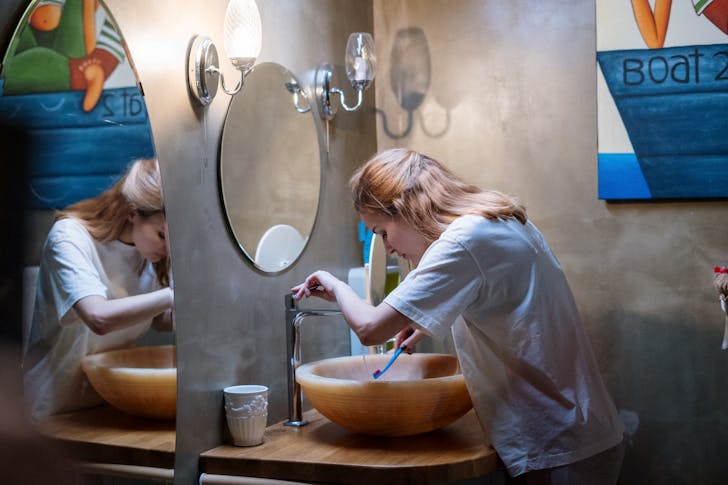When the sun sets, your body begins its nightly reset. But what you do before bed plays a big role in how well you sleep and how fresh your skin looks. Hygiene at night means creating a routine that sets you up for optimal rest and radiant skin.
Here are some essential bedtime habits that can make all the difference:
Wear Fresh and Clean Sleepwear
Your pajamas might be more important than you think. Wearing fresh, clean sleepwear helps keep bacteria and sweat from irritating your skin. Over time, unwashed sleepwear accumulates dirt, oils, and allergens, which can lead to breakouts or itchiness.
Washing your sleepwear frequently keeps you comfortable and helps your skin stay healthy.
Floss and Brush Your Teeth
Brushing your teeth is a no-brainer, but flossing often gets skipped. This simple habit prevents bad breath and gum issues that can disrupt your sleep.

Cotton Bro / Pexels / Properly floss and brush your teeth before bed to ensure hygiene at night.
Follow up with a thorough brushing to remove surface bacteria and keep your mouth fresh. The cleaner your mouth is, the better your overall hygiene at night.
Thoroughly Wash Your Face
A quick splash of water is not enough if you want clear, glowing skin. Thoroughly washing your face removes makeup, sunscreen, dirt, and oils that build up during the day. Leaving these impurities on your skin overnight can clog pores and lead to breakouts or dullness.
Use a Humidifier
The air in your bedroom can impact both your sleep and your skin. Dry air, especially in winter or air-conditioned spaces, can dehydrate your skin and make it harder to breathe comfortably.
Extra hydration from a humidifier keeps your skin supple and prevents it from feeling tight or flaky in the morning. Plus, it can reduce snoring and congestion, helping you wake up feeling more rested.
Keep Your Bed Linens Spotless
Your sheets and pillowcases are like magnets for sweat, oil, and dirt. Dirty linens can lead to skin irritation, breakouts, or even allergies. Washing your bed linens weekly - or more often for pillowcases - creates a clean surface for your skin to rest on.

Pixabay / Pexels / Keeping your bed fresh and clean ensures your nighttime environment supports restful sleep and skin health.
Good hygiene at night starts with a fresh, inviting bed.
Limit Screen Time Before Bed
Staring at screens before bed disrupts your body’s production of melatonin, the hormone responsible for sleep. This can make it harder to fall asleep and leave you feeling groggy in the morning.
Instead, switch to calming activities like reading a book or journaling. Creating a screen-free buffer zone before bed helps your brain relax, making it easier to drift off naturally.
Apply a Nourishing Lip Balm to Ensure Hygiene at Night
Your lips deserve attention too! Overnight, your lips lose moisture, especially if you breathe through your mouth. Applying a nourishing lip balm before bed helps lock in hydration, preventing dryness or cracking. A small step like this can make a big difference, leaving your lips soft and smooth by morning.
Keep a Glass of Water Nearby
Staying hydrated at night is often overlooked, but it is essential for overall health. Drinking too much water right before bed can lead to midnight bathroom trips, but having a glass of water nearby ensures you stay hydrated through the night.
Proper hydration supports your skin’s natural repair processes and prevents dryness.








